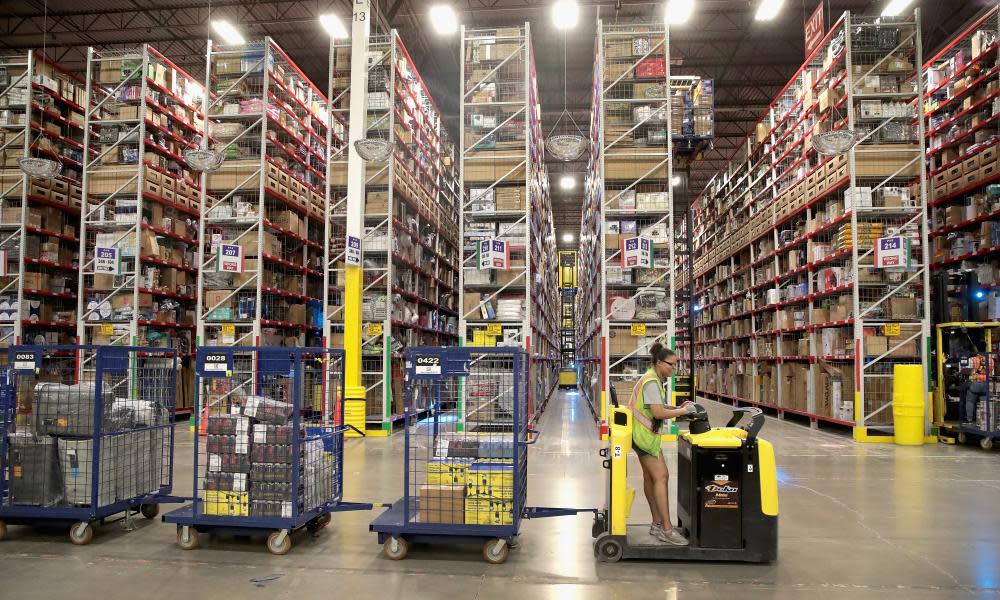Will Democrats be bold and pledge to break up tech monopolies?

For those Democrats who dream of being president, it’s no longer safe to play it safe. We live in a dangerous, unstable time in a democracy that is far from healthy. Many of the forces corroding it precede Donald Trump, despite progressives who would tell you otherwise – this entire century, so far, has been a misery for many Americans.
Four corporations dominate American life. They have the wealth of nations. They have generated unfathomable revenue, created a number of jobs and decimated many more. Their control of the economy is total.
They are Google, Amazon, Apple and Facebook. Unless we do something, their power will remain limitless.
Any Democrat running for president who claims to be a progressive should put trust-busting at the top of their agenda. Socialist or capitalist, big government or small, the priority should be the same: to ensure the people who consume goods and create goods are not exploited.
All four corporate behemoths are too large. These monopolies fuel staggering inequality and stifle the kind of economic growth that used to be more evenly distributed. Profits are immense and gains for actual workers are small – these corporations do not generate employment, let alone unionized employment, on the scale of earlier revolutionary giants.
Amazon is worth twice as much as Walmart, controls one of the largest newspapers in America, holds cities hostage for its new headquarters and generates 30% of all online and offline retail sales growth nationwide.
All bricks and mortar retail combined cannot compete with Amazon. After the offshoring of major industries, smaller towns and cities only had retail jobs, some of which remained unionized, to fall back on. Now that final safety net has been lit on fire. Amazon, a virulently anti-union corporation, pays good wages to a select number of highly educated workers and stashes the rest in warehouses, where they face grueling conditions for little pay.
Google controls more than 70% of the market share of search advertising. Together with Facebook, it has effectively gobbled up all online advertising. News publishers are at their mercy. Local news outlets, which depend on advertising to keep the lights on, are on the verge of extinction.
Facebook is now in the news for selling off the personal data it has harvested and profited from, stealing away what little privacy we had left. But this was a problem long before Cambridge Analytica, fake news and Trump’s ascendance.
For most Americans, their entire awareness of current events is shaped, one way or another, by Facebook and Google. These corporations unite as our sole digital consciousness, determining what we see and when we see it, with hidden algorithms beyond the reach of any regulator.
We consume this corporate-curated information on Apple smartphones. With a market cap of nearly $900bn, Apple is the world’s most valuable company. Its phones, manufactured under oppressive conditions in China, devour the attention span of millions.
When so much wealth and power is concentrated in the hands of a handful of men, we no longer have a functioning, fair democracy. We have an oligarchy where the whims of a few moguls of world-historical wealth – Bezos, Zuckerberg, Cook, Brin and Page – determine the fate of the national and world economies, the information we consume, and the range of opportunities available to us.
We know Trump, despite his obsession with Amazon’s Jeff Bezos, has no serious interest in shattering these monopolies. For him, this is simply personal: one billionaire besting him, by remarkable lengths, in a test of net worth.
Our only hope is a new president who has the guts and vision to confront the behemoths in our midst and restore some sense of fairness to the country. All Democrats fighting for the nomination must promise to break up these unprecedented monopolies. Otherwise, their progressivism is hollow.
We live in a new gilded age, as dramatically unequal as the first one, and only swift, radical action will turn the tide. In the wake of such tech dominance, no one can compete: not the small business owner, the news publisher, the grocery store worker, the musician, the retailer, the entrepreneur, or anyone else.
The Big Four own the present. They don’t have to own the future too.
Ross Barkan is a journalist and candidate for the New York state senate

 Yahoo News
Yahoo News 
